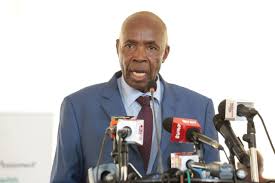The Government will be hosting the second Ministerial Meeting of the Task Force on the School Meals Coalition tomorrow.
The meeting brings together Ministers and high-level representatives from the Coalition’s 12 Task Force member countries to further advance its mission to ensure every child has access to a nutritious meal in school by 2030.
The School Meals Coalition is a network of over 100 governments, 3 regional bodies and over 130 partners committed to school meals and the ministerial meeting tomorrow takes place ahead of the G20 Heads of State Summit in Brazil on 18-19 November 2024.
In a press release from the Ministry of Education today ahead of the meeting, Kenya recently launched the National School Meals Coalition to increase the number of students benefitting from school meals from 2.6 million today to over 10 million by 2030
Developed with support from the UN World Food Programme (WFP) and The Rockefeller Foundation, the expansion of Kenya’s school meals programme involves a shift from carbon-heavy food imports to locally grown, drought-tolerant crops and vegetables, and a move towards cleaner cooking methods
In doing so, Kenya aims to transform its food systems, reduce its carbon footprint, and support its clean energy transition.
The United Nations World Food Programme (WFP) is the world’s largest humanitarian organization, saving lives in emergencies and using food assistance to build a pathway to peace, stability and prosperity for people recovering from conflict, disasters and the impact of climate change.
WFP hosts the Secretariat of the School Meals Coalition and drives actions to urgently improve and scale up school meal programmes to ensure that every child can receive a healthy, nutritious meal in school by 2030
Driven by Brazil’s G20 Presidency, the Global Alliance Against Hunger and Poverty is set to be launched at the November summit, with school meals featuring as a key cost-effective policy intervention to help tackle hunger and poverty worldwide.
The Task Force, co-led by Brazil, Finland, and France, acts as the decision-making body of the Coalition; it sets strategic direction, establishes yearly priorities, guides the Secretariat, and leads in political advocacy.
The Task Force consists of 12 countries and regional networks represented through their elected focal points with the current Task Force members being Kenya, The African Union, Brazil, Finland, France, Guatemala, Honduras, Japan, Rwanda, Senegal, Sweden, and the USA.

 Form one selection 2023/2024 faces uncertainty as KCPE 2023 Candidates, Parents take Knec to court
Form one selection 2023/2024 faces uncertainty as KCPE 2023 Candidates, Parents take Knec to court Education Ministry Rolls out 9,000 Elimu Scholarships for 2024 form one students
Education Ministry Rolls out 9,000 Elimu Scholarships for 2024 form one students